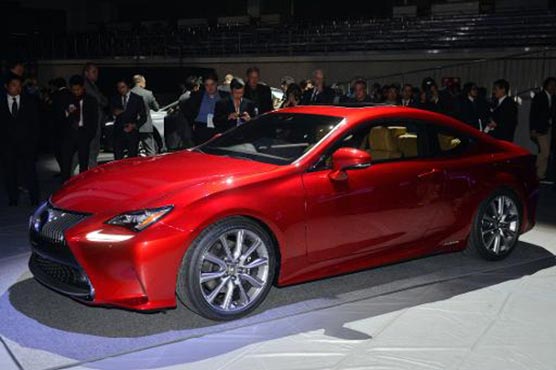Tokyo Motor Show opens

Relatively high prices and a slim offering of model choices have dented the buying of green cars.
TOKYO (AFP) - The Tokyo Motor Show kicked off Wednesday with Toyota unveiling an eco-friendly concept car aimed at broadening the appeal of green vehicles, a key theme of the event, which is held every two years.
A pioneer of hybrid vehicles, the world s biggest automaker rolled out its FCV concept car, a four-seater sedan that has a range of 500 kilometres (310 miles) -- longer than previous versions -- and can be recharged in just three minutes through hydrogen gas tanks stored inside the vehicle.
The vehicle, which Toyota said it expects to sell commercially in about two years, seeks to jump key hurdles that analysts say have hindered consumer buying of eco-friendly cars, including electric vehicles range and re-fuelling infrastructure.
Relatively high prices and a slim offering of model choices have also dented the buying of green cars despite automakers big investments in the sector.
Purchases of low-emission vehicles are forecast to grow, however, with further technological advances seen as crucial due to increasingly strict emissions standards.
Fuel cell vehicles are considered the holy grail of green cars because they emit nothing but water vapour from the tailpipe and can operate on renewable hydrogen gas.
Toyota executive vice president Mitsuhisa Kato said Wednesday that no matter how much the industry evolves, automakers still need to make vehicles that consumers want to buy.
"We must not turn cars into a simple means of transport -- a tool," he told reporters.
"We don t want a car that people neither love nor hate. We want to make cars that people fall madly in love with, cars that convince them they could never drive anything else."
Apart from Toyota, other automakers are also eyeing a widespread commercial offering including rival Honda, which already has a fuel-cell car, the FCX Clarity, available on a small scale in a limited number of markets.
Nissan s target for sales of its Leaf electric vehicle are way behind predictions from chief executive Carlos Ghosn, but Japan s number-two automaker said it remains hopeful.
"Electric vehicles have unique characteristics (and that gives Nissan) a continuing optimism in the long term potential of EV s," Ghosn said Wednesday.
Eco-friendly vehicles are popular high-tech Japan, with the show also exhibiting the latest advances in vehicle electronics.
"Cars without a driver, electronic driving assistance, radar, fuel consumption controls -- the link between cars and electronics is coming together more and more," auto expert Tatsuya Mizuno, head of Tokyo s Mizuno Credit Advisory, told AFP before the show started.
"The competition among electronics firms in the automobile market is increasing, just like their influence on the industry itself. This is going to mean changes in the way cars are built and even their design."
The exhibition s 43rd edition, which runs until December 1, features 177 exhibitors including parts suppliers from a dozen countries.
But US-based automakers, which have not attended since before the global financial crisis, are staying away again, as are South Korean producers, with the exception of Hyundai.
The big European automakers will be looking to boost their presence in the world s third-largest car market after China and the United States.
However, foreign brands hold a miniscule share -- just 4.5 percent -- of a market that saw more than 5.0 million vehicles sold in Japan last year.
That puny presence has long stoked anger among US and some European automakers, which say they have been effectively shut out of Japan through tariffs and other barriers. The simmering issue is a key obstacle in ongoing free-trade negotiations.
Luxury German brands including Mercedes-Benz, BMW and Porsche, which have seen significant success in Japan, are among this year s attendees, along with Audi, Volkswagen, Renault, Peugeot-Citroen, Britain s Land Rover and Sweden s Volvo.


